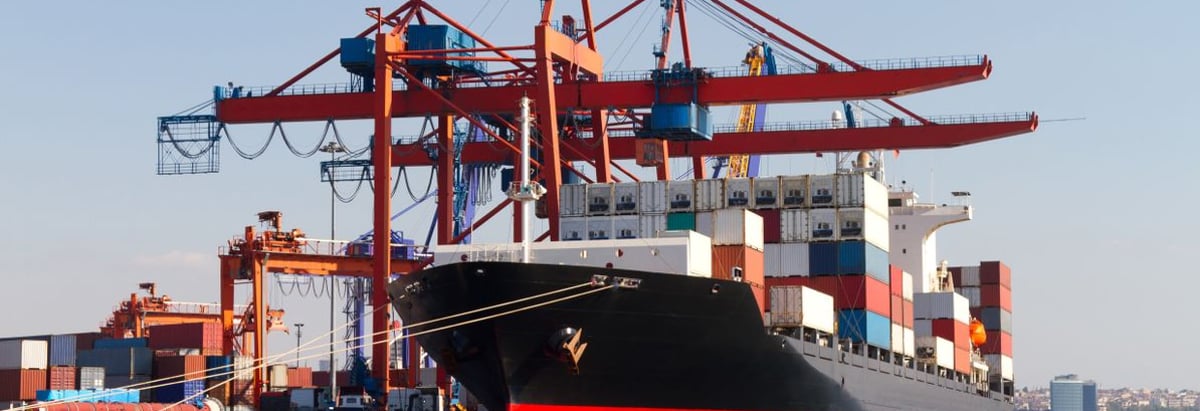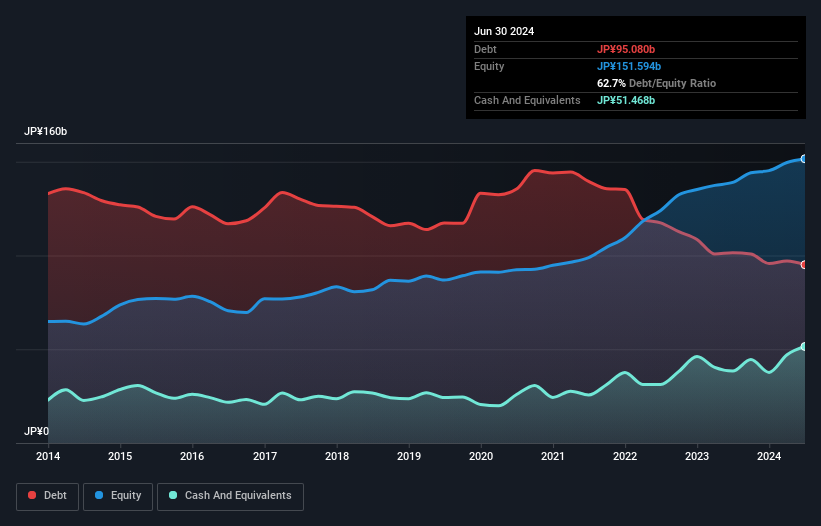
Howard Marks put it nicely when he said that, rather than worrying about share price volatility, 'The possibility of permanent loss is the risk I worry about... and every practical investor I know worries about.' When we think about how risky a company is, we always like to look at its use of debt, since debt overload can lead to ruin. We can see that NS United Kaiun Kaisha, Ltd. (TSE:9110) does use debt in its business. But the more important question is: how much risk is that debt creating?
When Is Debt Dangerous?
Debt is a tool to help businesses grow, but if a business is incapable of paying off its lenders, then it exists at their mercy. Ultimately, if the company can't fulfill its legal obligations to repay debt, shareholders could walk away with nothing. While that is not too common, we often do see indebted companies permanently diluting shareholders because lenders force them to raise capital at a distressed price. Of course, debt can be an important tool in businesses, particularly capital heavy businesses. The first step when considering a company's debt levels is to consider its cash and debt together.
See our latest analysis for NS United Kaiun Kaisha
How Much Debt Does NS United Kaiun Kaisha Carry?
As you can see below, NS United Kaiun Kaisha had JP¥95.1b of debt at June 2024, down from JP¥101.5b a year prior. However, it also had JP¥51.5b in cash, and so its net debt is JP¥43.6b.

How Healthy Is NS United Kaiun Kaisha's Balance Sheet?
The latest balance sheet data shows that NS United Kaiun Kaisha had liabilities of JP¥46.9b due within a year, and liabilities of JP¥87.1b falling due after that. Offsetting these obligations, it had cash of JP¥51.5b as well as receivables valued at JP¥35.4b due within 12 months. So it has liabilities totalling JP¥47.1b more than its cash and near-term receivables, combined.
While this might seem like a lot, it is not so bad since NS United Kaiun Kaisha has a market capitalization of JP¥95.9b, and so it could probably strengthen its balance sheet by raising capital if it needed to. However, it is still worthwhile taking a close look at its ability to pay off debt.
In order to size up a company's debt relative to its earnings, we calculate its net debt divided by its earnings before interest, tax, depreciation, and amortization (EBITDA) and its earnings before interest and tax (EBIT) divided by its interest expense (its interest cover). The advantage of this approach is that we take into account both the absolute quantum of debt (with net debt to EBITDA) and the actual interest expenses associated with that debt (with its interest cover ratio).
NS United Kaiun Kaisha has a low net debt to EBITDA ratio of only 1.1. And its EBIT covers its interest expense a whopping 14.6 times over. So we're pretty relaxed about its super-conservative use of debt. In fact NS United Kaiun Kaisha's saving grace is its low debt levels, because its EBIT has tanked 20% in the last twelve months. When it comes to paying off debt, falling earnings are no more useful than sugary sodas are for your health. There's no doubt that we learn most about debt from the balance sheet. But you can't view debt in total isolation; since NS United Kaiun Kaisha will need earnings to service that debt. So if you're keen to discover more about its earnings, it might be worth checking out this graph of its long term earnings trend.
But our final consideration is also important, because a company cannot pay debt with paper profits; it needs cold hard cash. So it's worth checking how much of that EBIT is backed by free cash flow. Over the last three years, NS United Kaiun Kaisha recorded free cash flow worth a fulsome 99% of its EBIT, which is stronger than we'd usually expect. That puts it in a very strong position to pay down debt.
Our View
Based on what we've seen NS United Kaiun Kaisha is not finding it easy, given its EBIT growth rate, but the other factors we considered give us cause to be optimistic. There's no doubt that its ability to to cover its interest expense with its EBIT is pretty flash. Looking at all this data makes us feel a little cautious about NS United Kaiun Kaisha's debt levels. While debt does have its upside in higher potential returns, we think shareholders should definitely consider how debt levels might make the stock more risky. The balance sheet is clearly the area to focus on when you are analysing debt. But ultimately, every company can contain risks that exist outside of the balance sheet. For example - NS United Kaiun Kaisha has 1 warning sign we think you should be aware of.
If, after all that, you're more interested in a fast growing company with a rock-solid balance sheet, then check out our list of net cash growth stocks without delay.
Valuation is complex, but we're here to simplify it.
Discover if NS United Kaiun Kaisha might be undervalued or overvalued with our detailed analysis, featuring fair value estimates, potential risks, dividends, insider trades, and its financial condition.
Access Free AnalysisHave feedback on this article? Concerned about the content? Get in touch with us directly. Alternatively, email editorial-team (at) simplywallst.com.
This article by Simply Wall St is general in nature. We provide commentary based on historical data and analyst forecasts only using an unbiased methodology and our articles are not intended to be financial advice. It does not constitute a recommendation to buy or sell any stock, and does not take account of your objectives, or your financial situation. We aim to bring you long-term focused analysis driven by fundamental data. Note that our analysis may not factor in the latest price-sensitive company announcements or qualitative material. Simply Wall St has no position in any stocks mentioned.
About TSE:9110
NS United Kaiun Kaisha
Engages in the marine transportation services and related business in Japan and internationally.
Flawless balance sheet established dividend payer.
Market Insights
Community Narratives




